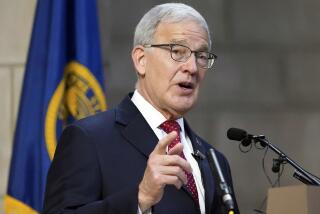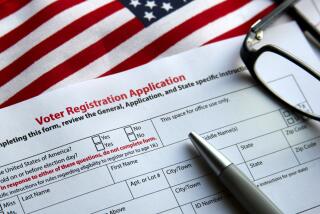Let Felons Cast Ballots and Others Will Follow
- Share via
A few years ago I asked the man who was then Florida’s speaker of the House what sense it made to keep felons who have served their sentences from ever voting in his state. He countered by asking -- as many Americans might, I suspect -- whether giving the vote to “everyone who has two arms and two legs is the best way to govern a democracy.”
I wish he could have tagged along as Larry Turner, a state representative in neighboring Tennessee, drove me down Memphis streets lined with housing projects, discussing why letting freed felons vote strengthens the democratic process.
Turner is a courtly, soft-spoken African American in his mid-60s. He grew up at the tail end of the Jim Crow era, knowing what it means to be ignored politically, and he has worked for years to amend his state’s felon-disenfranchisement laws, among the nation’s most restrictive.
He has had little luck.
Before the 2000 election, Tennessee was one of about a dozen states with laws that prevented people with felony convictions from ever voting. Four years later, it is one of seven states -- several of them key swing states -- that have preserved these laws.
Nationally, about 5 million people are legally prohibited from voting by a hodgepodge of state laws that disfranchise a growing pool of felons. In some states, such as Utah, the denial of the vote lasts as long as a person is in prison. In California and New York, parolees also cannot vote, and in Texas and several other states neither can those on probation. In Washington and Arizona, suffrage waiting periods are imposed after a person finishes his sentence. And in Mississippi, Alabama, Florida, Tennessee, Kentucky, Virginia and Iowa, the process for felons to get back the vote is so onerous that in almost all instances they can never vote again -- unless they move to one of the 43 states that doesn’t permanently bar felons from voting.
Turner blames Tennessee’s laws for crippling the democratic process in some of the mostly black precincts he represents, where as few as 200 people vote in some places with large felon populations, compared with 1,500 in other precincts.
Pollsters blame Americans’ retreat from participation in democracy over the last 30 years on apathy.
That might be true on New York City’s Upper West Side. But Turner will tell you that, in the poor neighborhoods he knows so well, it’s the laws that keep felons from voting that, directly or indirectly, drive down voter turnout and keep people from getting involved.
Indirectly, the problem is this: If you can’t vote, you’re unlikely to encourage your family and neighbors to vote. The millions of dollars spent to teach people to InkaVote or find their candidate on a computer screen don’t alter this basic fact. So, in poor neighborhoods where there are often plenty of felons, fewer legally eligible people will show up on election day to use all the expensive new voting technology.
This ripple effect is intensified by snafus and malfeasance, and it undercuts democracy even in places where felons have had their voting rights restored, according to the politicians, community activists, lawyers and freed felons I’ve interviewed nationwide.
In Washington state, for example, I interviewed people still denied the vote because their crimes occurred so long ago that the Department of Corrections couldn’t locate the paperwork proving they had fulfilled their sentences. Nearly 900,000 Texans have old felony records that, in practice, stop them from registering. Texas changed its laws in the late 1990s to allow felons who have completed their sentences to vote, but many believe a felony conviction disenfranchises them for life.
Experts are now looking at similar collateral effects elsewhere. In some cases, people convicted of misdemeanors, rather than felonies, believe they cannot vote. In others, people with felony convictions who live in states where there are no voting restrictions have heard on the “prisoners’ grapevine” that they have lost the right to vote.
From California to Florida, I’ve found that correctional officials, parole officers, fellow prisoners and parolees -- and even electoral registration personnel -- provide incorrect or misleading information. More often, post-prison civics lessons just don’t get through.
Take Nevada: This swing state, which President Bush won in 2000, once permanently disfranchised felons. After the election, reform-minded legislators pushed through a bill that allowed many first-time and nonviolent felons to go through a speeded-up vote-restoration process. But when I recently spent an afternoon with voter registration volunteers at a music superstore in a poor neighborhood of northwest Las Vegas, I met a dozen former prisoners who hadn’t gotten the message.
What can we do about it?
Congress can mandate universal access to the ballot for federal elections, and it can pay to teach voting rights to ex-prisoners and the government agencies with which they deal. And state legislators ought to push for re-enfranchisement legislation as part of the Help America Vote Act packages being crafted in statehouses across the country.
Proponents of tough disenfranchisement laws argue that most felons aren’t the voting type. They’re wrong. And that’s one reason why that Florida legislator was also wrong. When felons participate in the Republic, faith in the system spreads through the hardscrabble neighborhoods where it has been most badly shaken.
Even the majority of citizens who have never broken a law in their lives must understand why that restoration of faith is important.
More to Read
Get the L.A. Times Politics newsletter
Deeply reported insights into legislation, politics and policy from Sacramento, Washington and beyond. In your inbox three times per week.
You may occasionally receive promotional content from the Los Angeles Times.










